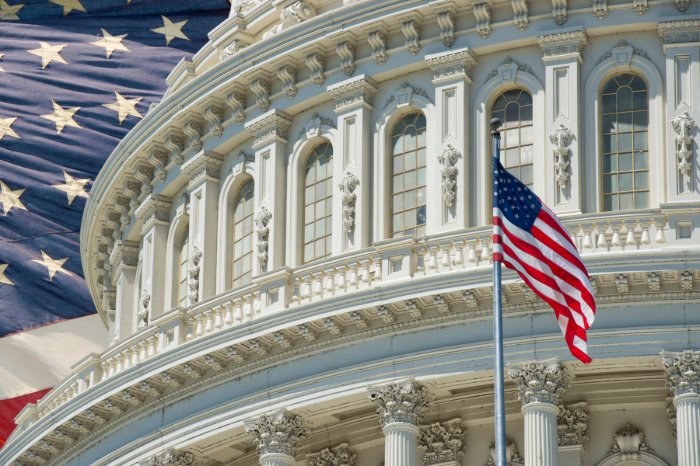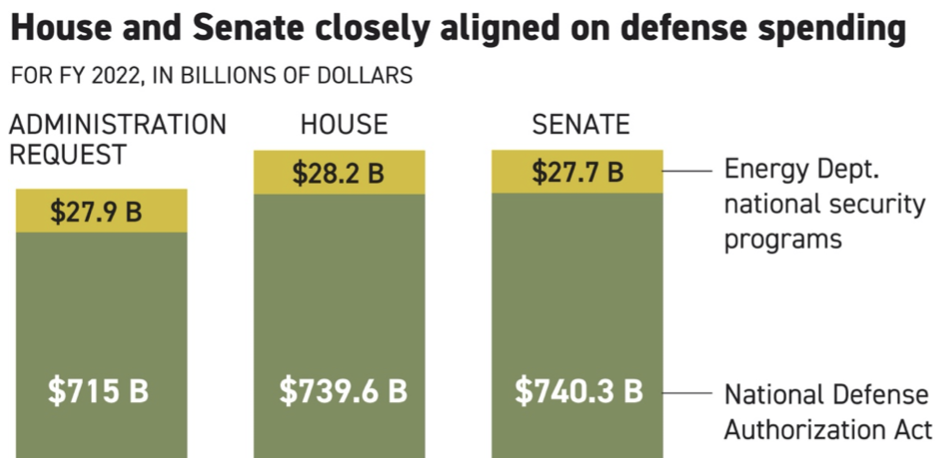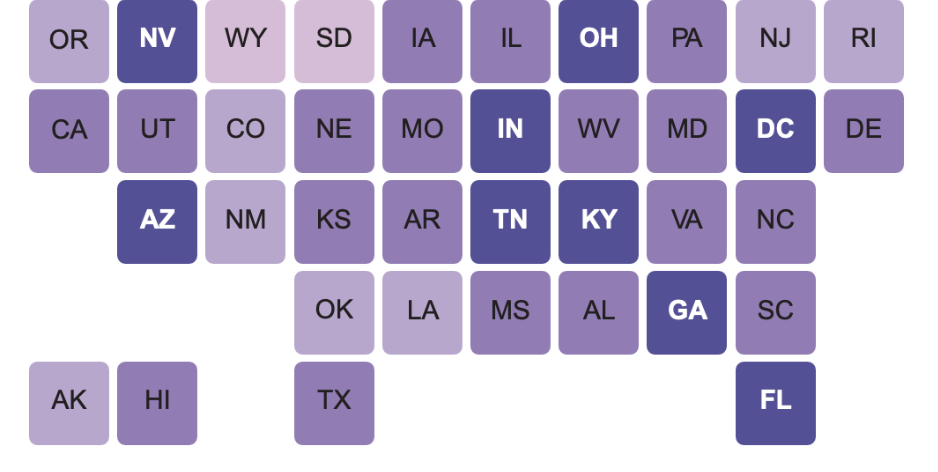Latest news from Washington, D.C. produced by Total Spectrum/SGA exclusively for members of the Arizona Chamber of Commerce & Industry
More Info: Michael DiMaria | Partner and Vice President of Business Development | 602-717-3891 | [email protected]

Thanks for your interest in Washington, and thanks for reading This Week in Washington.
I decided to approach our first issue since the August break by using Heard on the Hill to provide an overview of the major and controversial items that are on the legislative agenda.
The most significant event on this month’s calendar was the 20th anniversary of the 9-11 attack. I assembled three of my Total Spectrum team members – Todd Smith, Steve Ruhlen, and Ramona Lessen – and we talked about our experiences and reactions that day. Todd was over in the House of Representatives, Ramona was in the Senate, Steve Ruhlen was in the White House, and I was a political consultant working in my office two blocks from the Senate. Each of us had different experiences but our reactions were quite similar. It was a great conversation, and I hope you enjoy reading it.
Ramona has a brief report covering a hearing before the Senate Banking Committee on oversight of the Securities and Exchange Commission, and a second of the Senate Foreign Relations Committee examining the U.S. withdrawal from Afghanistan.
This fall may prove to be a busy one in Washington, and we’ll do our best to keep you up to date.
We thank you as always for reading and welcome your thoughts and suggestions. Be well.
Stay cool and stay safe.

Steve Gordon, Managing Partner
Heard on the Hill
By Steve Gordon, Total Spectrum Strategic Partner
I long ago concluded that God invented the month of August so people could take some time to think about and reflect on the first seven months of the year, to live in the moment, and to plan for the balance of the year. I took full advantage of August to do all three. It has been quite a year, and we’re only just finishing the front nine.
January 2021 started with a rally that quickly turned into an attack on the Capitol, which created the environment for the House of Representatives passing articles of impeachment on January 13th. President Biden’s inauguration was on January 20th, and the Senate trial of President Trump began on February 9th, ending with an acquittal.
August ended with the U.S. pulling our last troops out of Afghanistan, along with many Afghans who worked with our troops. September started with the 20th anniversary of the 9-11 attacks on New York, Washington, D.C., and Pennsylvania. There will be a demonstration this Saturday to support the people who are in jail for attacking the Capitol (I’m pausing to let that sink in), and President Biden and Congress are dealing with a legislative agenda that is longer than your leg.
The President has been dealing all year with the continuing impact of new COVID variants on Americans and the American economy. The President and his staff are also focused on politics and next year’s election. All the seats in the House of Representatives and one-third of the seats in the Senate will be in play, and the results could easily upset Democrats’ current control of Washington.
My last Heard on the Hill was published July 14th, and our last edition of This Week in Washington arrived in your inbox on July 28th. It’s great to be back.
The Upcoming Legislative Agenda
The Bipartisan Infrastructure Bill. Speaker Pelosi promised moderate Democrats that she would hold a vote on this bill in the House by September 27th, but that’s on a Monday, so the vote will be the following day. The Speaker also promised progressives in her caucus that there would not be a vote on the infrastructure bill without a bill on the social infrastructure portion of the President’s proposal, so the race is on to complete the companion bill. The U.S. Chamber, in conjunction with a number of groups, put out a lengthy piece in support of the bill.
Social Infrastructure Bill. The legislative language is being written concurrently in the Senate and the House, and it is being created to pass by a simple majority under the Senate’s budget reconciliation rule. All the House Committees have concluded their respective markups. The House Rules Committee will now combine their work products for the consideration of the House of Representatives. One interesting thing to note here is that there were four Democrats to vote against key provisions, thus making Speaker Pelosi’s job at passing the overall package on the House Floor more difficult.
The predicted total cost of the bill will be around $3.5 trillion and will include major reconstruction of the social safety net. It is rumored that the legislative language of the bill will require 10,000 pages of paper, and that there will be an executive summary before the summary.
The bill will include provisions for family and medical leave, health insurance subsidies, tax cuts for low- and middle-income workers, tuition-free community college for two years, and a host of additional things. The House Ways & Means Committee released several days ago their section-by-section summary of the anticipated Universal Paid Family and Medical Leave provisions, but that is only a start. I am sure there is a kitchen sink someplace in those 10,000 pages.
The ‘pay-for items’ (tax increases) are equally important because key moderate Democrat Senators want the bill to be fully paid. Congressman Kevin Brady, former Chairman and now Ranking Member of the House Ways & Means Committee, said in a statement this week that the proposed tax increases will severely impact Americans and American jobs.
President Biden and Congressional Democrats want to fund this bill by taxing high income individuals –generally those who make over $400,000 per year. We received in advance of the Ways & Means markup a list of anticipated tax increases for high income individuals, as well as a summary of key features in current law, in the Biden Administration’s proposal, in the proposals of Senator Wyden (Chairman of the Finance Committee), and in the agreement of the Organization of Economic Cooperation and Development.
Several controversial matters are also being readied for insertion into the reconciliation bill. I have heard that some Democrat legislators want to include the PRO Act, which would make it easier to join unions. Another proposal inserts an immigration plank into the bill. But the Senate’s Byrd Act – named after the late Senator Robert C. Byrd – prohibits extraneous subjects from insertion when the Senate is considering appropriations or reconciliation bills, and the Parliamentarian rules on what is extraneous.
Republicans can’t stop the reconciliation bill from passing if Senate Democrats remain united. But Republicans can point out the impact that this spending and taxing will have on the federal budget, on the economy, and on Americans throughout society. The Republican Senate Policy Committee, chaired by Senator Roy Blunt (R-MO), put out a paper this week on the impact they believe these tax hikes will have on the U.S. economy, indicating that “Democrats’ tax hikes will hit small businesses, family farms, and the paychecks and retirement plans of working Americans – while raising prices for consumers.”
Raising the Debt Limit. The Congressional Budget Office has advised Congress that the Secretary of the Treasury will exhaust extraordinary measures to avoid exhausting the debt limit. This will require either an increase or suspension of the federal debt limit. Treasury projects the extraordinary measures will be exhausted during October.
A vote to raise the debt limit would be subject to the filibuster. Leader McConnell has said that he does not expect any Republicans to vote for the debt increase. There has been some discussion about including the debt increase as an amendment to the continuing resolution to continue government funding beyond September 30th, and that’s Senator McConnell’s preferred solution.
Appropriations for the fiscal year that starts on October 1. Funding for the government runs out on September 30th. There are discussions ongoing that would continue the current level of funding for a few months, and that would be the most logical approach. Shutting down the government has been tried before, rarely achieves anything, and makes the public more cynical of its government. There’s no education in the second (or third) kick of the mule.
9-11…The 20th Anniversary
A conversation between Steve Gordon, Todd Smith, Steve Ruhlen, and Ramona Lessen
Steve Gordon:My late mother used to say that folks of her generation could remember what they were doing when they heard the news about Pearl Harbor. Americans who were alive 20 years ago to experience 9-11 can easily say the same thing, and that’s especially true for those of us who were in New York City and Washington, D.C.
I assembled three of my Total Spectrum colleagues to reflect on that day 20 years ago. Ramona Lessen was the scheduler for Senator Bill Frist (R-TN); he later became Majority Leader Frist and Ramona became his executive assistant, with an office in the Russell Senate Office Building. After serving as Chief of Staff to four U.S. Congressmen, Steve Ruhlenwas Deputy Assistant to Vice President Dick Cheney in 2001, with an office in the White House. Todd Smith was the Deputy Chief of Staff and Legislative Director to then-Congressman Nathan Deal, who later was elected Governor of Georgia, and Todd became the Governor’s Washington representative. I was a political consultant with Senator Jon Kyl (R-AZ) and Senator Wayne Allard (R-CO). My firm Steve Gordon and Associates officed two blocks north of the Hart Senate Office Building.
September 11th was a bright, clear day. I was in my office at 507 Capitol Court when I received a call at 8:55 am from Mike Bennett, Senator Allard’s Chief of Staff. He told me that a commercial airliner had just hit the North Tower of the World Trade Center in New York and said I should turn on the television. I turned it on just in time to see the second plane hit the South Tower at 9:01 am. A few minutes later — at 9:37 am — a third plane hit the Pentagon, which is across the Potomac River in Crystal City, Virginia. A fourth and final plane targeted the Capitol, but the passengers pushed back the terrorists, and the plane crashed into an area around Shanksville, Pennsylvania at 10:03 am.
I was glued to the television. My emotions went from fear to anxiety and back to fear. The rumors were almost endless, and most of them ended up being mostly right. I remember Senator Chuck Hagel (R-NE) called me to make sure I was ok. It was clear at that exact moment that everything had changed, and it was just as clear that everybody knew it.
Ramona, tell me about your experiences and your emotions that day.
Ramona Lessen: We had a constituent breakfast that Tuesday morning and I had returned to my office in the Russell Senate Office Building to get ahead of the rest of the day. I had the TV on, as I always did, and saw the first plane hit one of the twin towers. I called my husband and we both watched as the second plane hit the second tower. The news indicated that it was a terrorist attack and that a plane was possibly headed to the White House or the Capitol, and then we saw that the Pentagon had been hit.
I rushed out of my office but was instructed by Capitol Police officers to not leave and go back in my office. I did go back and called my husband, who told me to leave immediately. Several staff were now exiting the building, some very upset and crying, but the Capitol Police were trying to keep everyone calm. When we exited, everyone commented on what a beautiful fall day it was with a clear and brilliant sky. I remember running into some tourists who were trying to enter the Russell Building and Capitol Police turned them away. I worried all day about them.
A Frist staffer had an apartment three blocks from the Capitol, so about 10 of us ended up there. It was an obvious guy apartment with a half circle of about six easy chairs, none of which matched, around the TV – a perfect setup for watching a football game. We all just sat and stared at the TV. The room was silent as we sat and watched the first building come down. Everyone was stunned, and we watched in disbelief when the second building came down. Everyone was trying to get on their phones calling parents, friends, relatives, but nobody could get through because cell circuits were clogged. I was able to communicate with my husband because we had Nextel phones which had a direct walkie talkie feature.
We spent hours at my colleague’s apartment, but very little was said. We had the windows open and continuously heard F-18 fighter jets flying back and forth down around the Capitol and down the Mall. My husband came to pick me up at 4 PM and I noticed that Washington was shut down. There were no cars on the streets and intersections were completely open, but now they had positioned Patriot ground-to-air missiles on the Capitol grounds.
I had not had any contact with Senator Frist since our constituent breakfast. The next I saw him was when the House and Senate Members assembled on the Capitol steps and broke into “God Bless America.” There was a feeling at that moment that everything had changed dramatically in the United States. Twenty years later, routine life in Washington has been altered and may never feel the same as when I had entered the Russell Building at 7:45 am on September 11th.
Steve Gordon: Thanks Ramona. Todd Smith, our Georgia Group Chairman, was in Congressman Deal’s Washington, D.C. Congressional Office. Todd, what was your day like?
Todd Smith: The Congressman was on an early flight to Washington, D.C., and I was in the office preparing for his arrival. I turned on the news and saw that one of the towers of the World Trade Center was smoking and on fire. It was speculated that a plane or a helicopter had crashed into it, but it was all early speculation. I was watching the live feed when a second plane hit the other tower, and shortly thereafter a third plane hit the Pentagon.
I was on the phone with the Congressman and our chief of staff to decide how to react. Some of the staff in the office were understandably scared and started to cry. At that time, there was not an emergency alert system in the House offices but only a fire alarm. The news showed people running from the White House, so I told my staff to quickly leave the building and go directly home.
I was the last one out of the office and started to drive home to my townhouse in suburban Virginia. I was also one of the last ones to get through a section of interstate before the police shut down that route. I could see black and white smoke pouring out of the Pentagon all the way home.
I turned on the television when I got home and learned that a fourth plane had crashed in Pennsylvania. It became very clear very quickly that things could have turned out differently for me and so many others who worked on Capitol Hill had it not been for the heroes who battled the terrorists on United Airlines Flight 93, forced down in Pennsylvania.
Steve Gordon: Thanks Todd. Steve Ruhlen, you were Deputy Assistant to Vice President Cheney on 9-11. I can only imagine what a terrifying experience you went through.
Steve Ruhlen: The day started normally with an early morning legislative briefing in the Eisenhower Executive Office Building, which is right next to the White House. I remember that I was the first person to leave the briefing because I had to get to Capitol Hill for a meeting. As I was leaving, I ran into a senior member of the White House Press Team. He told me that a plane had hit the World Trade Building – and not a small plane – an airliner. I went back to my office instead of going to Capitol Hill and watched the second plane hit the World Trade Center. Everybody knew something was terribly wrong, and it was confirmed when the third plane hit the Pentagon. My boss came in and said that “we had to get out of here – fast.” Sirens like I have never heard started blaring throughout the building. It was jarring, and all staffers started for the exits. Younger staffers threw their shoes aside and ran for the street.
We left the White House, but there was no plan where to go or what to do. I first went to my wife’s office, which was a few blocks away. That’s where I saw the smoke coming out of the Pentagon, and the seriousness of the situation really hit home. After I made sure my wife was okay, I walked to the office of a major U.S. auto manufacturer, where White House staff were forming to perform ad hoc staff functions.
I realized that the President’s legislative agenda was now changed dramatically and probably permanently for the duration of his first term. It was clear we would have to focus on the response to the attack, although I wondered what the response would entail. I tried reaching key contacts on Capitol Hill but couldn’t because cell phone service was severely hampered. Senators and Members of Congress had been relocated to a federal building near the Capitol, but I knew that all movement concerning our national security for at least the next few days would be directed by the President and his close advisors.
Washington, D.C. was in massive gridlock. People were going everywhere, and nobody was getting anywhere. Yet within a few hours, everything had changed: all the cars had left the streets, and apparently everyone had gotten home. I left my car at the White House and drove home with my wife. There was an eerie quiet everywhere, and just like that our world in Washington had been transformed.
Steve Gordon: Thanks everyone. I watched shows about 9-11 over the weekend, and all the emotions and visions that I had 20 years ago came back to me. Americans thought that the oceans protected our country from enemy attacks, and we had the best military in the world. We wondered how could this have happened, and how could terrorists have put this attack together. It was a day that changed us in so many ways.
Hearing Report
By Ramona Lessen, Total Spectrum Executive Director
Senate Banking, Housing and Urban Affairs Committee Hearing on the Oversight of the U.S. Securities and Exchange Commission
Tuesday, September 14, 2021; 10:00 a.m.
To view a livestream of the hearing please click here.
Opening Statements:
Senator Sherrod Brown (D-OH), Chairman
Senator Patrick Toomey (R-PA), Ranking Member
Witnesses:
The Honorable Gary Gensler
Chair
U.S. Securities and Exchange Commission
Senate Foreign Relations Committee Hearing: Examining the U.S. Withdrawal from Afghanistan
Tuesday, September 14, 2021; 10:00 a.m.
To view a livestream of the hearing please click here.
Opening Statements:
Senator Bob Menendez (D-NJ), Chairman
Senator Jim Risch (R-ID), Ranking Member
Witness:
The Honorable Antony J. Blinken
Secretary of State
U.S. Department of State
What you need to know about House and Senate versions of NDAA
4 in 5 beds are full as Covid-19 hospitalizations soar
Most workers will be covered by Biden’s vaccine mandate
Chip shortages continue to stall auto production
Congressional Calendar
All times EDT
Monday, September 13
- 10 a.m. House Judiciary Committeemarkup of legislative proposals to comply with S. Con. Res. 14.
- 11 a.m. House Energy and Commerce Committee markup of legislative proposals to comply with S. Con. Res. 14.
- Noon. House Financial Services Committee markup of legislative proposals to comply with S. Con. Res. 14, along with a bill that would reauthorize Native American housing assistance and a bill that would allow landlords to apply for aid on behalf of tenants without getting their signatures and prevent eviction for 120 days.
- 2 p.m. House Veterans’ Affairs Committee markup of legislative proposals to comply with S. Con. Res. 14.
- 2 p.m. House Foreign Affairs Committee hearing on the U.S.’ policies on Afghanistan and the withdrawal effort. Secretary of State Antony Blinken testifies.
Tuesday, September 14
- 9 a.m. House Ways and Means Committee markup of legislative proposals to comply with S. Con. Res. 14.
- 10 a.m. Senate Foreign Relations Committee hearing to examine the U.S.’ withdrawal from Afghanistan. Secretary of State Antony Blinken testifies.
- 10 a.m. Senate Judiciary Committee hearing on pending nominations.
- 10 a.m. Senate Banking, Housing, and Urban Affairs committee hearing on the oversight of the U.S. Securities and Exchange Commission. SEC Chair Gary Gensler testifies.
- 10 a.m. House Transportation and Infrastructure Committee markup of legislative proposals to comply with S. Con. Res. 14.
- 11 a.m. House Small Business Committee virtual hearing on small businesses and entrepreneurs in honor of National Small Business Week.
- Noon. House Homeland Security Committee markup of legislative proposals to comply with S. Con. Res. 14.
- 2:30 p.m. Senate Homeland Security Committee hearing on the nominations of Tovah Calderon to be an associate judge at the D.C. Court of Appeals, and Kenia Lopez, Rupa Puttagunta and Sean Staples to be associate judges at D.C. Superior Court.
Wednesday, September 15
- 9:30 a.m. Senate Environment and Public Works Committeemarkup on various Environmental Protection Agency nominees, including Jeffrey Prieto’s nomination to be EPA general counsel, among other nominations and legislation.
- 9:45 p.m. Senate Judiciary Committee markup on six judicial nominations — including the nominations of Toby Heytens to be a U.S. Circuit Judge for the Fourth Circuit and Hampton Dellinger to be the Assistant Attorney General at the Justice Department’s Office of Legal Policy — and two bills, including one measure that would let state AGs keep antitrust cases in their preferred court.
- 10 a.m. Senate Commerce, Science, and Transportation Committee markup of four nominations, including Alexander Hoehn-Saric’s nomination to be the head of the Consumer Product Safety Commission.
- 10 a.m. Senate Judiciary Committee hearing on the inspector general’s report on the FBI’s handling of the Larry Nassar investigation.
- 10 a.m. Senate Commerce, Science, and Transportation Committee hearing on four nominations, including Victoria Marie Baecher Wassmer’s nomination to be the Transportation Department’s chief financial officer.
- 10:30 a.m. Senate Foreign Relations Committee hearing on the nominations of Julieta Valls Noyes to be an assistant secretary of state and Denise Campbell Bauer to be the U.S. ambassador to France and Monaco.
- 2:30 p.m. Senate Foreign Relations Committee virtual hearing on five nominations, including C.S. Eliot Kang’s nomination to be an assistant secretary of state.

















Add comment